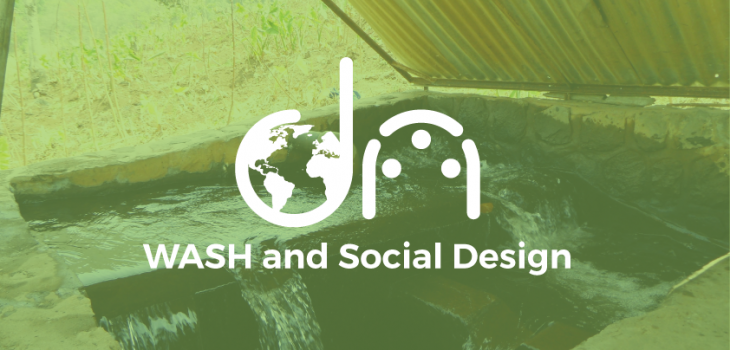 Blog
Blog
WASH and Social Design
WASH and Social Design
In this article we focus on the importance of solving WASH issues through Social Design.
9th October 2017 - Design for Need, Social Design, WASH
By Finn Brownbill and Matt McClumpha
Welcome back! Or if you’re new to Design for Need’s blog, nice to meet you. Regardless of whether you’re a day one or new, I am so glad you are here now at the beginning of our Social Design for International Development series! If you missed the previous article, we talked about ‘What is Social Design?’. If you are not aware of what social design is, it might be worth tracking back to that article before venturing on with this one. But if you are all clued up, then let’s get on with it shall we. This month we will release three articles, each focusing on our area of expertise in social design. Starting with ‘Water, Sanitation and Hygiene’ (WASH) and then moving on to ‘Agriculture’ and finishing with ‘Environmental Conservation’. All of which are interlinked, contributing to global development and challenging poverty, global inequality and environmental injustice.
‘Water, Sanitation and Hygiene’ or as it’s more commonly known for simplicities sake, ‘WASH’, is a field in global development and is one of the world’s biggest challenges. The World Health Organization (WHO) estimates that “2.5 billion people – more than one third of the global population – live without basic sanitation facilities” while 750 million people still lack access to safe and clean drinking water. However, WASH is interlinked to so many other problems.
It is not simply the face value problem of not receiving clean water, WASH issues branch into a wide range areas many would not associate with water. For example, a lack of WASH facilities prevent children from attending schools, thus preventing suitable education reducing the number of highly skilled jobs. A country deeply affected by WASH issues would as a result have a failing infrastructure as well as a suffering population. Additionally, WASH is also essential in meeting women’s menstrual, sexual and reproductive health needs. Therefore, when the standards are low, so too is the gender equality. A lack of WASH transcends physical damage as it affects psychological health, livelihoods and social structures. It facilitates disease and destroys agriculture. The list goes on, affecting the fate of millions of individuals facing poverty.
In terms of ‘Water Security’, or access to sufficient quantities of clean water is a complex issue which vary, dependant on the focus area. Some environments are far too dry and natural water sources are miles away. For some places, they have an abundance of water at their disposal, however without proper resources to clean the water it remains contaminated. For others, they may even have access to clean water, but the water management system is inefficient and faulty. And sadly, some communities are too overpopulated to have enough water to go around completely.
Clearly, there are countless problems to be solved, hence why we chose to specialise in this field. Simply because where there are ‘countless problems’, naturally, there will be ‘countless solutions’. So because optimism is the best way forward, we will try our very best to spread our wings and deal with as many as we possibly can. Social Design can be expensive, high tech and complicated. However, when taking a holistic approach to acknowledging who your target market is - which in our case is individuals living in impoverished communities - turning up with a £10,000 eco toilet powered by solar energy and AI voice giving you instructions on how to wash your hands is probably not the best way to go.
We believe it’s best not to overcomplicate things when dealing with social design for WASH issues. Nothing needs to be flashy, instead it needs to be cheap, simple, sustainable and easy to maintain. This is, and will always be our protocol.
Take for example the coast of Peru which is a true desert of sand and rock. In the surroundings of Lima, the capital, there are many settlements where people live with meager water supplies. This is mainly due to an extremely dry climate with no natural water sources and drinking the seawater is extremely dangerous. However, this location is also renowned for it’s frequent fog periods, being driven inland by the wind. Non-profit organisations such as FogQuest have designed a fog harvesting system for this very situation. It can be made of double layer mesh net supported by two posts rising from the ground. Atmospheric water is completely clean, only basic skills are required to construct it and the net is the same material for the fishing nets the local town uses. Fantastic!
Now let’s look at sanitation, this refers to the provision of facilities and services for the safe disposal of human urine and feces, gross but a very important issue as 2.6 billion people lack access to these facilities. In some areas the ‘flying toilet’ is still being used, sounds interesting right? This involves using plastic bag to ‘do your business in’, the plastic bag is then tied and thrown in ditches, on the road side, or simply as far away as possible, hence the term ‘flying toilet’. This practice can lead to blockages in drainage systems, the spread to deadly diseases and, of course, the risk of being hit by the bags if blindly tossed. This is a prime example of a social design gone wrong, caused by desperation and no alternatives. It is a quick fix which doesn’t take into account the sustainable future.
Finally, let’s look into hygiene which is important for many different reasons; personal, social, health and psychological. By improving hygiene standard we help prevent the development and spread of infections and illness, cutting it off at its source. A fantastic example of improving hygiene would be the ‘Tippy Tap’ which is a simple, hands free way to way your hands in areas without running water. These are the designs we admire, they aren't flashy they simply solve the problem in the most sustainable way possible.
Thank you again for joining us for this Social Design edition's article about WASH. As I’m sure you are aware, we pride ourselves on our cheap and sustainable designs, as our preference is on practicality over flashiness. You will find that this ethos has earned its place in all of our design projects, not just in relation WASH. The next article in this Social Design series will be all about Agriculture. So stay tuned for more of the same.
Thank you,
Finn and Matt

Finn and Matt
Both founders Matt and Finn occasionally join forces to write articles together, like this one. Because two heads are better than one. Enjoy!